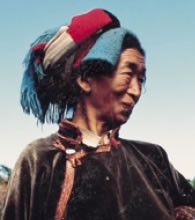Naju in China

Photo Source:
Copyrighted © 2026
Operation China, Asia Harvest All rights reserved. Used with permission |
Send Joshua Project a map of this people group.
|
| People Name: | Naju |
| Country: | China |
| 10/40 Window: | Yes |
| Population: | 1,900 |
| World Population: | 1,900 |
| Primary Language: | Naxi |
| Primary Religion: | Buddhism |
| Christian Adherents: | 0.00 % |
| Evangelicals: | 0.00 % |
| Scripture: | New Testament |
| Ministry Resources: | Yes |
| Jesus Film: | Yes |
| Audio Recordings: | Yes |
| People Cluster: | Tibeto-Burman, other |
| Affinity Bloc: | Tibetan-Himalayan Peoples |
| Progress Level: |
|
Introduction / History
The Naju claim to have originated on the Tibetan Plateau. Between 800 and 1,000 years ago they migrated down from the plateau. Some stayed behind at Lugu Lake on today's Sichuan-Yunnan border where they gradually developed into the group now known as Mosuo. The majority continued farther south to Lijiang and became today's Naxi people. Some time later, a group of the Mosuo left their homeland at Lugu Lake and they developed into the presentday Naju group. For several hundred years the Naxi and Mosuo had their own kings who dominated other ethnic groups and controlled commerce throughout the region.
Although they have been officially included under the Naxi nationality, the Naju have a different name, language, and history from the Naxi in Yunnan, and the Naheng and Mosuo in Sichuan. The Naju actually prefer to call themselves Naru, but their alternative name is used in Operation China to avoid confusion with the unrelated Naru of northern Yunnan.
What Are Their Lives Like?
The whole western and southwestern part of Sichuan Province was formerly known as Xikang. It was a lawless and violent province where few outsiders dared to enter. Much of the murder and strife was the result of opium trade which flourished until communist forces destroyed the poppy harvests in the early 1950s. Today most Naju live in poverty, growing vegetables and herding livestock.
What Are Their Beliefs?
Tibetan Buddhism is the predominant religious adherence among the Naju. They were originally polytheists but were converted to Buddhism by the Tibetans at least several centuries ago. Mixed in with their beliefs is a strong fear of powerful spiritual deities that they believe dwell inside mountains. As a result of these beliefs the Naju spend much of their time, energy and money on appeasing and placating the spirit world.
There is no record of missionary activity in Muli or Yanyuan counties prior to 1949. The geographic, linguistic and cultural isolation of the Naju creates barriers to Christian outreach among them in the future. Perhaps a few believers live among the Lisu in southern Sichuan, but there is no record of any Christian activity among the needy Naju.
What Are Their Needs?
The Naju people have few if any opportunities to experience the abundant life that comes from fellowship with the King of kings. Who will go to them?
Prayer Points
Pray that God will end their isolation; and that believers will attempt to reach them with the gospel.
Pray for bold workers who are driven by the love of the Holy Spirit to go to them.
Pray for an unstoppable movement to Christ among them.